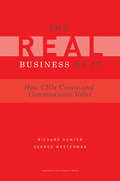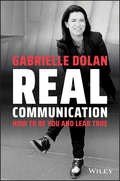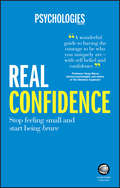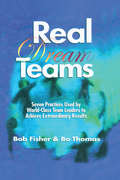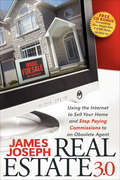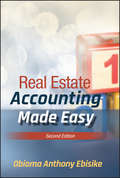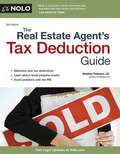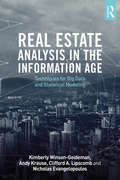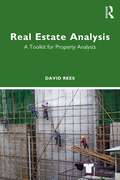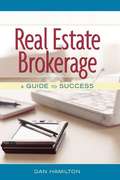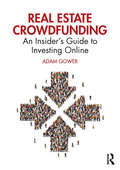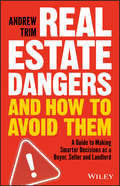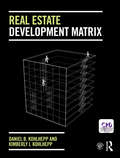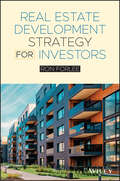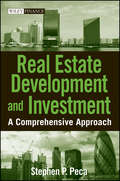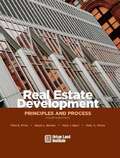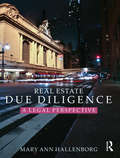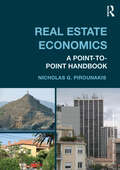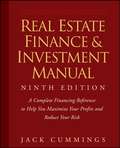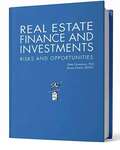- Table View
- List View
Real Business of IT
by Richard Hunter George WestermanIf you're a general manager or CFO, do you feel you're spending too much on IT or wishing you could get better returns from your IT investments? If so, it's time to examine what's behind this IT-as-cost mind-set.In The Real Business of IT, Richard Hunter and George Westerman reveal that the cost mind-set stems from IT leaders' inability to communicate about the business value they create-so CIOs get stuck discussing budgets rather than their contributions to the organization. The authors explain how IT leaders can combat this mind-set by first using information technology to generate three forms of value important to leaders throughout the organization:-Value for money when your IT department operates efficiently and effectively-An investment in business performance evidenced when IT helps divisions, units, and departments boost profitability-Personal value of CIOs as leaders whose contributions to their enterprise go well beyond their area of specializationThe authors show how to communicate about these forms of value with non-IT leaders-so they understand how your firm is benefiting and see IT as the strategic powerhouse it truly is.
Real Communication: How To Be You and Lead True
by Gabrielle DolanEffective communication through authentic leadership A rapidly evolving workplace and disruptive technologies have created a growing demand for transparency and authenticity in communication from business leaders. Yet many decision-makers find themselves far behind the curve when it comes to understanding and meeting the evolving expectations of employees and customers. Real Communication: How to Be You and Lead True reveals how to guide and communicate in a way that is authentic and will help business leaders truly connect and engage with their teams, customers, and coworkers. • Communicate more effectively • Improve employee engagement • Manage organisational changes • Help teams cope with change When employees trust their leaders, businesses thrive. In Real Communication you will find everything you need to implement new strategies, instill core values, and cultivate engagement.
Real Confidence: Stop feeling small and start being brave
by Psychologies MagazinePsychologies provides their inspirational yet rigorous approach to the perennial topic of confidence How confident are you? If you feel like your confidence could do with a bit of a boost to help make personal and professional situations easier Real Confidence will help you take on the confidence robbers, keep track of your confidence daily and incorporate confidence-building habits into your life on a regular basis. Written in association with Psychologies Magazine, the leading magazine for intelligent people, covering work, personal development and lifestyle issues Real Confidence is: Packed full of tips, techniques and advice to help you build your confidence Based on scientific evidence and cutting edge global research Rigorous with credible content presented in a light and accessible manner Inspirational yet down to earth and practical
Real Democracy Occupy: No Stable Ground (Routledge Studies in Radical History and Politics)
by Anna SzoluchaThe liberal representative model of democracy is in a crisis. In protest camps, neighbourhood assemblies and through other non-hierarchical initiatives, the Occupy movement as well as other recent anti-austerity movements are redefining democracy as a positive way to engage with this crisis. The more direct democratic models of organisation that they are employing are not aimed at making the politicians regain their lost public legitimacy. Instead, direct democracy is perceived by these movements as a radical alternative to the established forms of representation. Can direct democracy become an actual alternative to representative democracy? This book takes an engaged and in-depth look at the Occupy movement in Ireland and the San Francisco Bay Area in the US in order to present the most up-to-date evidence of the changing nature of popular democratic demands. It takes an insider’s perspective to analyse the internal processes and iterations of the movement. Establishing links between social movements and transformations of democracy, as well as underscoring the significance of the recent movements for the future of democracy, this book is essential reading for students, scholars and activists interested in direct democracy, social movements, and radical politics more generally.
Real Dream Teams: Seven Practices Used by World-Class Team Leaders to Achieve Extraordinary Results
by Robert Fisher Bo ThomasWant to achieve spectacular success in your personal and business life? Looking for ways to mold and capture superior teamwork, cohesion, and bone-deep dedication? Put Real Dream Teams on your list of must reads.From the headlines used to describe groups such as the 1992 U.S. Olympic basketball team, to Hollywood production moguls, to attorneys clashing in major criminal cases, we have all heard the phrase "dream teams" used and misused. Real Dream Teamsis a book that focuses on extraordinary efforts by conditioned winners who have achieved outstanding results through what the authors call "synergistic group dynamics." Let Real Dream Teams point you in the direction of becoming a more effective team leader and team member. Read of team efforts and extraordinary practices and results as demonstrated by recipients of the Nobel Prize, the Medal of Honor, national championships, and best-in-industry awards. Take tips from those who have achieved their membership in Real Dream Teams:
Real Economics for Real People (3rd Edition)
by Charles L. BallardEconomics applied to everyday life.
Real Effects of the Subprime Mortgage Crisis: Is it a Demand or a Finance Shock?
by Shang-Jin Wei Hui TongA report from the International Monetary Fund.
Real Estate 3.0: Using the Internet to Sell Your Home and Stop Paying Commissions to an Obsolete Agent
by James JosephThis book has been written to educate real estate owners and sellers how the marketing of their property by the real estate sales community has changed to their detriment and to show them that is a solution to the current problem and this solution is the Internet and how to effectively utilize it to sell their real estate all the while saving big money in doing so. The book is combined with and refers to a new system for selling real estate online that enables sellers for the first time to not just market their property but to actually track and complete the entire transaction electronically.
Real Estate Accounting Made Easy
by Obioma A. EbisikeGrasp the fundamentals of real estate accounting, finance, and investments Real Estate Accounting Made Easy is just that—an accessible beginner’s guide for anyone who needs to get up to speed on the field of real estate accounting, finance, and investments. Beginning with the elementary aspects of real estate to ensure that you’re comfortable with the subject matter, it goes on to explore more in-depth topics in a way that’s easy to digest. The book begins with discussions on introduction to the real estate industry and basic real estate accounting. Building on knowledge from the initial chapters, the book goes on to cover the different form of real estate organizations, financial statements such as the balance sheet, income statement, shareholders equity and the statement cash flow, and more. • Provides theories and practices of real estate from an accounting, financial, and investments perspective • Advanced transactions are discussed in an easy-to-understand manner • Content reflects the FASB’s new standards on revenue recognition and lease accounting • Accounting for operating property expenses, operating expenses reconciliation and recoveries, lease incentives and tenant improvements, budgeting, variance analysis are discussed in detail • Covers types of financing for real estate acquisitions, accounting for real estate investments, project development costs, and real estate brokerage • The book also walks you through the financial audit process If real estate is a new territory for you, fear not! This book helps new auditors, accounting, finance, and investment professionals, and users of financial reports understand the fundamentals of the financial aspect of the real estate business.
Real Estate Agent's Tax Deduction Guide, The
by Stephen FishmanThe real estate agent's essential guide to tax deductions Understanding tax deductions can be the difference between having a successful year--or not--for real estate agents and brokers. By taking advantage of the many tax deductions available to them, real estate professionals can end each year with more money in their pockets and less owed to the IRS. Too often, these valuable deductions are overlooked, even though it's easy to take advantage of them once you understand the rules. This book explains all you need to know in plain English with lots of examples and practical information. Learn about the most important deductions and how to plan and track your expenses all year so you avoid problems with the IRS. The information is organized into categories that explain the rules for each type of deduction, including: -start-up expenses -operating expenses -home and outside office -health care -vehicles and travel -entertainment and meals -and many more It also explains essentials like depreciation deductions, deducting losses, and keeping proper records.
Real Estate Analysis in the Information Age: Techniques for Big Data and Statistical Modeling
by Clifford A. Lipscomb Kimberly Winson-Geideman Andy Krause Nick EvangelopoulosThe creation, accumulation, and use of copious amounts of data are driving rapid change across a wide variety of industries and academic disciplines. This ‘Big Data’ phenomenon is the result of recent developments in computational technology and improved data gathering techniques that have led to substantial innovation in the collection, storage, management, and analysis of data. Real Estate Analysis in the Information Age: Techniques for Big Data and Statistical Modeling focuses on the real estate discipline, guiding researchers and practitioners alike on the use of data-centric methods and analysis from applied and theoretical perspectives. In it, the authors detail the integration of Big Data into conventional real estate research and analysis. The book is process-oriented, not only describing Big Data and associated methods, but also showing the reader how to use these methods through case studies supported by supplemental online material. The running theme is the construction of efficient, transparent, and reproducible research through the systematic organization and application of data, both traditional and 'big'. The final chapters investigate legal issues, particularly related to those data that are publicly available, and conclude by speculating on the future of Big Data in real estate.
Real Estate Analysis: A Toolkit for Property Analysts
by David ReesReal Estate Analysis: A Toolkit for Property Analysts presents economic and financial models, applications and insights, packaged as a toolkit for analysts and other participants in commercial and residential real estate markets. Participants in property markets – analysts, brokers, commentators as well as investors and tenants – move seamlessly across a range of physical and financial markets. They employ models that illuminate market activity: the tools of supply and demand to explain rental trends and to forecast vacancy rates and construction cycles; forecasts of macro-economists foreshadow shoppers’ spending behaviour in shopping malls and the growth in demand for office space; capital market arithmetic to apply discount and capitalisation rates. Currently these topics are often scattered through textbooks. This book brings these tools together and situates them in a real estate market context. Topics addressed include: The interaction of markets – capital, space and physical assets Debt, the cost of capital and investment hurdle rates Real options – valuing lease contracts and land Risk – what counts, what doesn’t (systemic and non-systemic risk) Discounted rates and capitalisation rates – interpreting spreads to sovereign bond yields Externalities – why do markets “fail”; what are the “solutions”? Property rights – different rules, different outcomes Exploitation for natural resources (exhaustible, renewable) – how does discounted cash flow analysis (DCF) fit in? Cost-benefit analysis – the analytics of compensation payments Forecasting – purpose and process The foundations and the scaffolding that underpin and support real estate market analysis are the focus of this book. Its purpose is to complement, sometimes augment, the subject matter of real estate training programs. The prospective audience includes curious professionals and researchers, seeking perspectives that extend standard class-room fare.
Real Estate Brokerage: A Guide to Success
by Dan HamiltonDesigned to meet the requirements of a real estate brokerage course, this new book concentrates on successful and innovative recruiting and retention strategies - the main focus of any viable real estate enterprise. As an increasing number of salespersons want more of the commission and want more services provided by the brokerage firm, Hamilton addresses the issue of survival for the real estate brokerage. Real-life case studies, group discussions and analysis applications throughout help equip users establish and manage a successful real estate brokerage.
Real Estate Concepts: A Handbook
by Ernie JowseyThe essential reference tool for all real estate, property, planning and construction students. Real Estate Concepts provides built environment students with an easy to use guide to the essential concepts they need to understand in order to succeed in their university courses and future professional careers. Key concepts are arranged, defined and explained by experts in the field to provide the student with a quick and reliable reference throughout their university studies. The subjects are conveniently divided to reflect the key modules studied in most property, real estate, planning and construction courses. Subject areas covered include: Planning Building surveying Valuation Law Economics, investment and finance Quantity surveying Construction and regeneration Sustainability Property management Over the 18 alphabetically arranged subject specific chapters, the expert contributors explain and illustrate more than 250 fully cross-referenced concepts. The book is packed full of relevant examples and illustrations and after each concept further reading is suggested to encourage a deeper understanding. This book is an ideal reference when writing essays, assignments and revising for exams.
Real Estate Crowdfunding: An Insider’s Guide to Investing Online
by Adam GowerReal Estate Crowdfunding: An Insider’s Guide to Investing Online introduces the reader to basic real estate investment concepts and then takes a deep dive into how to invest passively yet wisely in real estate syndications. This book will teach the reader how to: • invest in crowdfunded real estate syndicates • understand key financial concepts used in the industry • diversify their investment portfolios • read between the lines of investment contracts • maximize profit while minimizing losses This book is a guide to the foundational financial concepts upon which all real estate projects are based and explains the language of real estate from an insider’s perspective. It provides a road map of what to watch for and how to win at the game of passive real estate investing.
Real Estate Dangers and How to Avoid Them: A Guide to Making Smarter Decisions as a Buyer, Seller and Landlord
by Andrew TrimEssential information for anyone with property Real Estate Dangers and How to Avoid Them is a must-read guide for anyone thinking of buying or selling property, or becoming a landlord. Whether you’re looking for your dream home, to sell a property, or to invest, flip or rent out an existing investment, this book is packed with the insider information you need to avoid getting ripped off. By shining a light on the flawed and unnecessary aspects of the real estate industry, this book will help you make smarter decisions based on knowledge rather than “advice,” saving you time, money and headache. Stories of those who have seen the dangers highlight the ways in which this outdated system takes advantage of first-timers and experienced investors alike—and expert guidance shows you how to steer clear of the traps and pitfalls lurking around every transaction. Nearly everyone will have their hands in real estate at some point, and the real estate industry can be intimidating—after all, you rarely make financial transactions this large. But the truth is that the industry can be quite simple and can go quite smoothly, if you eliminate the distractions and focus on making smart decisions. This book shows you the real truth about the industry, helping you: Avoid the traps that rip off buyers and sellers Make smart decisions, minimise financial risk and let the system work for you Identify unnecessary add-ons and bogus charges Learn the tricks of the trade so you can save your money Become a smarter landlord and attract quality tenants. With clear, no-nonsense advice for buyers, sellers, landlords, and flippers, Real Estate Dangers and How to Avoid Them arms you with the knowledge you need to succeed in the property business.
Real Estate Development Matrix: A Handbook
by Daniel B Kohlhepp Kimberly J. KohlheppThis book presents a new way of thinking about, teaching, learning, and practicing real estate development. Real Estate Development Matrix describes the process in a two-dimensional model and presents seven Development Stages which form the horizontal axis, and eight sets of Development Tasks which form the vertical axis to define a 56-cell matrix. In each cell, money is spent and risks are taken to achieve certain tasks and thereby create (or destroy) value. This holistic process considers the entire life cycle of real estate from its "green field" inception to its "brown field" state. The book is written by a real estate developer and academic, and the presented material is conceptual, practical, and non-technical. Jargon has been minimized as much as possible as the author introduces an entirely new model for real estate development that is both academically authoritative and developed in practice. It is aimed at a general professional audience participating in the development process, but equally the book is ideal for use as a textbook in undergraduate and graduate courses in real estate development, and an excellent supplemental text for business courses discussing real estate finance and investment. It may also be used as a textbook for professional courses, workshops, or seminars in real estate development. The book is supported by an interactive website at http://realestatedevelopmentmatrix.com/
Real Estate Development Strategy for Investors
by Ron ForleeIn an ultra-competitive real estate market, what differentiates the truly successful real estate developers from the others? If you want to achieve greater returns and fully leverage your investment, you&’ll need new and creative ideas to set you apart and give you an edge. In Real Estate Development Strategy for Investors, successful developer and bestselling author Ron Forlee shares how you can turn your property portfolio from a hobby into a highly lucrative career. Featuring industry-insider strategies, an advanced take on fundamental investment types and detailed case studies, this book will give you the methodologies and strategies to help you find better investment deals and increase your overall profits—whether investing in residential or commercial property development. This book is perfect not only for developers and agents but also for everyday Australians looking to boost their financial security by investing in real estate development. Its fresh perspective on alternative strategies provides new ideas and creative methods for getting ahead in today's hot property development market. Discover new and effective directions for your real estate investments. Learn how to: form a real estate investment syndicate find low-cost development land secure funding from alternate sources budget better and control costs use blockchain technology to save money and time.Real Estate Development Strategy for Investors is a must-read for any investor seeking to go beyond the ordinary and advance their career in real estate development.
Real Estate Development and Investment
by S. P. PecaReal Estate Development and InvestmentA Comprehensive ApproachWritten by real estate industry veteran Stephen Peca, this timely guide skillfully outlines the various phases of the real estate development process and addresses some of the most important issues associated with this discipline.Using numerous illustrations and anecdotes, this book takes you through the development process, from historical considerations and idea formulation to financial feasibility and asset disposition, while covering the entire cycle of real estate development for various property types. Topics touched upon throughout these pages include: The key factors affecting demand for different land uses and development The interaction of market research, financing, planning, contract negotiation, marketing, leasing, and property management The need for universal, current, and broad knowledge The importance of ethics in the development process The role of different professionals and companies involved in the development process Environmental considerations in real estate development And much moreFilled with in-depth insights and practical advice, this reliable resource will help you gain a firm understanding of the functional skills necessary to be successful in this field and familiarize you with several often-overlooked-but essential aspects of commercial real estate development.
Real Estate Development: Principles and Process
by Mike E. Miles Marc A. Weiss Gayle L. Berens Mark J. EppliIdeal for anyone new to real estate development, the fourth edition of this bestselling book covers each stage of the process step by step, explaining the basics of idea conception, feasibility, planning, financing, market analysis, contract negotiation, construction, marketing, and asset management. Thoroughly updated, the book includes material on financing and marketing.
Real Estate Due Diligence: A legal perspective
by Mary Ann HallenborgReal Estate Due Diligence is the first textbook on due diligence, the cornerstone of every successful real estate deal. Due diligence is designed to uncover potential risks posed by a real estate acquisition, financing, or development project and failure to carry it out successfully can result in costly oversights and diminished investment returns. This book demonstrates how to assess and manage legal risks on properties such as office buildings, shopping centres, industrial buildings, apartments, and hotels—before the transaction closes. Real estate students and practitioners are taken through all of the essential due diligence areas, including: Titles and ownership issues Zoning and land use Liens and mortgages Condition assessments Environmental and operational concerns And lease analysis Throughout the book, major laws and court cases are used to illustrate due diligence issues and provide rich opportunities for classroom study and discussion. Practice points and comprehensive due diligence checklists help readers to go on to put their learning in practice. This book fills a gap in the real estate literature and is perfect for use as a college textbook, a practitioner’s guide, or for industry training.
Real Estate Economics: A Point-to-Point Handbook (Routledge Advanced Texts in Economics and Finance)
by Nicholas G. PirounakisReal Estate Economics: A point-to-point handbook introduces the main tools and concepts of real estate (RE) economics. It covers areas such as the relation between RE and the macro-economy, RE finance, investment appraisal, taxation, demand and supply, development, market dynamics and price bubbles, and price estimation. It balances housing economics with commercial property economics, and pays particular attention to the issue of property dynamics and bubbles – something very topical in the aftermath of the US house-price collapse that precipitated the global crisis of 2008. This textbook takes an international approach and introduces the student to the necessary ‘toolbox’ of models required in order to properly understand the mechanics of real estate. It combines theory, technique, real-life cases, and practical examples, so that in the end the student is able to: • read and understand most RE papers published in peer-reviewed journals; • make sense of the RE market (or markets); and • contribute positively to the preparation of economic analyses of RE assets and markets soon after joining any company or other organization involved in RE investing, appraisal, management, policy, or research. This book should be particularly useful to third-year students of economics who may take up RE or urban economics as an optional course, to postgraduate economics students who want to specialize in RE economics, to graduates in management, business administration, civil engineering, planning, and law who are interested in RE, as well as to RE practitioners and to students reading for RE-related professional qualifications.
Real Estate Finance and Investment Manual
by Jack CummingsUpdated and revised to include ten years of new developments in real estate investment, Real Estate Finance and Investment Manual, Ninth Edition is the definitive guide to financing for all real estate investors. Understand all the financing options, learn how to choose an appropriate strategy, read about insider techniques, and get hands-on experience with case studies and helpful checklists.
Real Estate Finance and Investments: Risks and Opportunities
by Peter Linneman Bruce KirschEdition 5.2 of this book, co-authored with long-time colleague, Bruce Kirsch of Real Estate Financial Modeling, is an exploration of the key concepts of real estate finance and investment strategy. The book (published in 2022), is based on Dr. Linneman’s Wharton classes and was written in response to his frustration with texts that concentrate excessively on theoretical detail and literature, while ignoring “real world” considerations. This book not only covers the key theoretical and mathematical underpinnings of real estate finance, but also stresses the ambiguity of investment decision making. The book is designed to help you understand that there is no singular, simplistic, or formulaic answer to any real estate finance problem. Rather, real estate finance is fundamentally driven by judgement and experience, with an eye to the numbers. <p><p>The goal is to help you evaluate the risks and opportunities of real estate assets and investments as you embark upon the long and unending road of strengthening your judgement. The formulas and templates found in the book are intended to help the reader assemble and organize information. Understanding and mastering the tools included in the book will provide you with a strong foundation in real estate finance. This book focuses on what to do thereafter. Knowing how to build a financial model and calculating the internal rate of return in a spreadsheet is not the same as making a profitable real estate investment. Judgement comes one mistake at a time.
Real Estate Finance and Investments: Risks and Opportunities (Fourth Edition)
by Peter LinnemanThis book explores the key concepts of real estate finance and Investment strategy. It Is not a formulaic analysis of numbers that yield "the answer" to any and all real estate investment decisions. Instead, this book is designed to help you understand that there is no singular, or simplistic, answer to any real estate finance problem. Rather, real estate finance is fundamentally driven by judgment and experience, with an eye to the numbers. The goal of this book is to help you embark upon the long and unending road of building your judgment.
